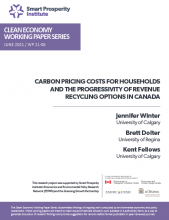By Jennifer Winter, Brett Dolter and G. Kent Fellows
The Government of Canada's implementation of the Pan-Canadian Framework on Clean Growth and Climate Change (PCF) mandates a floor price on greenhouse gas emissions in all provinces and territories in Canada.
Using synthetic household microdata, we quantify the direct and indirect costs of carbon pricing for households in each province and across the income distribution, and identify the net cost to households under four potential revenue-recycling approaches. We construct estimates of household energy use (electricity, natural gas, gasoline and home heating oil) using expenditure data from Statistics Canada's Social Policy Simulation Database and Model (SPSD/M). We also use the SPSD/M expenditure data, combined with emissions embodied in final consumption, to calculate indirect carbon pricing costs; these are the carbon pricing costs embodied in products purchased by Canadian households.
Our methodological approach to including indirect costs allows us to investigate the effect of complementary policies — such as the federal output-based pricing system for large emitters — in mitigating costs to households. We use SPSD/M to analyse four revenue-recycling options: (1) a means-tested sales tax (GST/HST) credit increase; (2) a lump sum dividend; (3) a sales tax rate reduction; and (4) an increased basic exemption for personal income taxes. We characterise the distributional impact and progressivity of each revenue-recycling option.
We find the carbon tax is generally progressive even without revenue recycling, the GST rebate and lump sum rebate are progressive, the sales tax rate reduction is mostly regressive, and the income tax change is regressive. Importantly, the large-emitters system mitigates the indirect costs that exacerbates the effect of carbon pricing on households.
The Clean Economy Working Paper Series disseminates findings of ongoing environmental and clean economy work conducted by researchers from a range of disciplines. These working papers are meant to make results of relevant scholarly work available in a preliminary form. Although these papers have not undergone a peer-review process, they meet general standards of scholarly excellence. The views expressed in these working papers are those of the authors and do not necessarily reflect the opinions of Smart Prosperity Institute.



